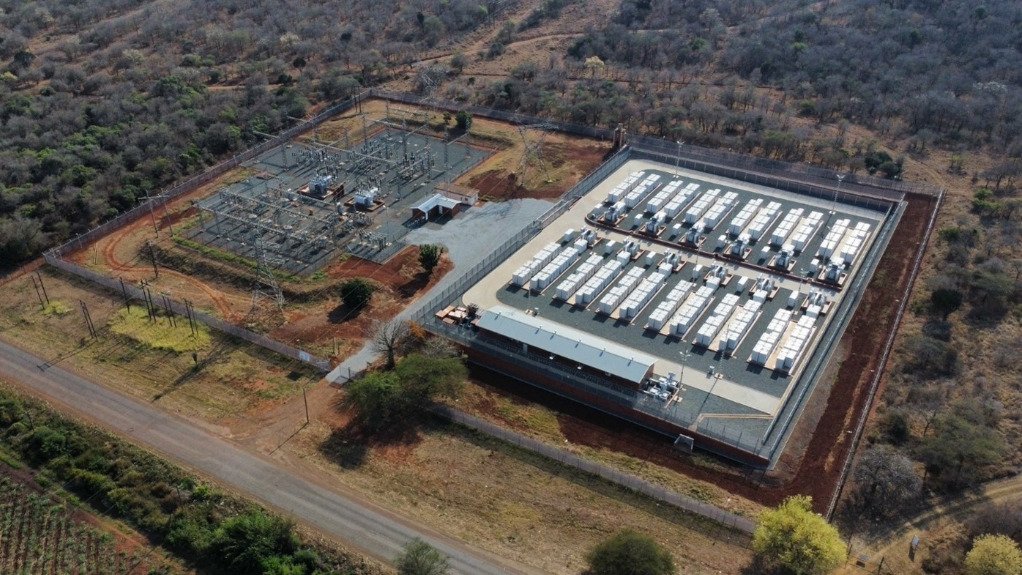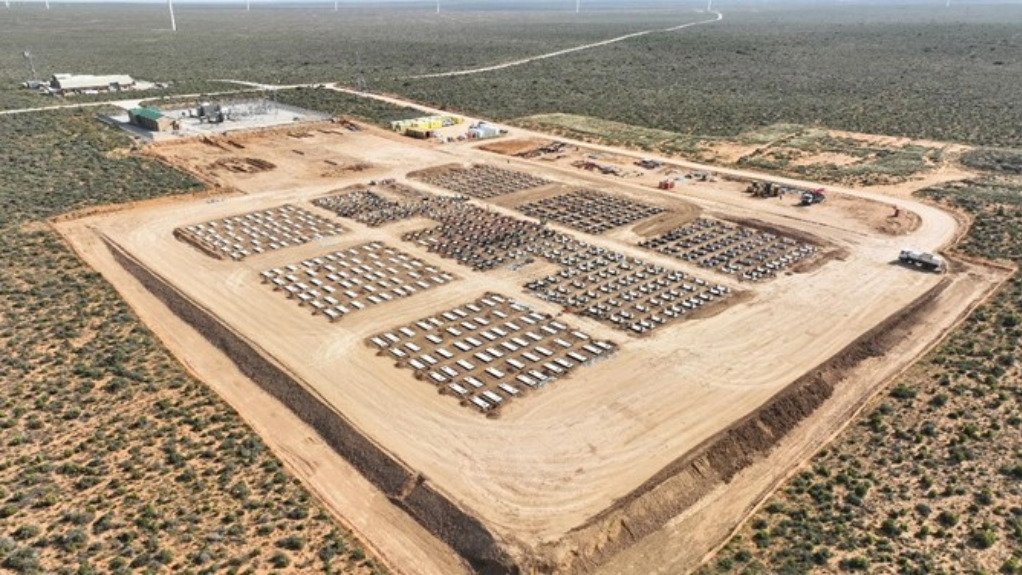Eskom leads large-scale commercial BESS rollout



PONGOLA 40MW SITE Phase 1BESS installations are strategically located in the Western Cape, Eastern Cape, Northern Cape and KwaZulu-Natal
SKAAPVLEI 80 MW SITE Phase 1 prominently features projects in the Cape provinces owing to the regions’ proximity to renewable-energy sources and distributed generation sites
State-owned electricity utility Eskom is leading the large-scale commercial rollout of battery energy storage system (BESS) technology in South Africa, aiming to demonstrate its feasibility and benefits, with Phase 1 currently under way and Phase 2 in development, says Eskom generation group executive Bheki Nxumalo.
Currently, the Eskom BESS rollout programme is the largest to be implemented in South Africa and entails 1 440 MWh distributed BESS with 60 MW solar PV.
“Eskom’s integration of BESS with [solar] PV systems is recognised as a highly effective approach to boosting energy security, improving economic efficiency and promoting environmental sustainability,” Nxumalo says.
Phase 1 involves installing about 199 MW of additional capacity, providing 833 MWh of storage across eight Eskom distribution substation sites. This phase also includes about 2 MW of solar PV capacity, he explains.
He adds that Phase 2, which is currently in the planning and development stage, will include the installation of 144 MW, equivalent to 616 MWh of storage, across four Eskom distribution sites and one transmission site, with an additional 58 MW of solar PV capacity.
However, he advises that Phase 2 has been delayed, owing to funding challenges and Eskom’s debt relief conditions. “The utility is currently exploring various financing options for this phase,” Nxumalo explains.
The completion of Phase 2, therefore, will depend on factors such as available funding, Public Finance Management Act approval, environmental authorisations and licensing approval from energy authority National Energy Regulator of South Africa.
BESS Locations
Initial BESS installations for Phase 1 are strategically located in the Western Cape, Eastern Cape, Northern Cape and KwaZulu-Natal.
“The scope of the project entailed a high-level needs identification from each of the operating units involved in the project, so the introduction of BESS could mitigate and address current voltage and capacity constraints on their networks,” Nxumalo says.
Each potential site was evaluated against criteria including the size, capacity, and charging and discharging characteristics of the battery, as well as any additional ancillary support required, such as voltage, frequency or quality of supply support.
Nxumalo adds that land availability, and high-level environmental analyses, were critical in determining site suitability. Additionally, site readiness, while secondary, was considered in the final selection.
He notes that projects in the Cape provinces feature prominently in Phase 1 of the project, owing to the regions’ proximity to renewable- energy sources and distributed generation sites.
Looking ahead, Eskom plans to expand BESS installations to other regions and is in the early stages of identifying additional sites across the country that could benefit from BESS projects.
As part of the utility’s Just Energy Transition programme, consideration has also been given to the installation of additional BESS projects at various power stations in the Mpumalanga area, Nxumalo says.
Eskom’s BESS Approach
According to Eskom, its investment in BESS aligns with its objectives of enhancing grid stability, integrating renewable energy and addressing network constraints.
Eskom asserts that BESS can help alleviate loadshedding. With the ability to discharge energy for a minimum of four hours, a BESS site with a 200 MW/800 MWh capacity holds significant stored energy, equivalent to one unit at the Medupi power station running for an hour.
BESS enables efficient renewable-energy integration and use, storing excess power during periods of overgeneration and releasing it when renewable generation is low. This reduces energy waste, mitigates renewable energy independent power producers’ curtailment, and ensures a reliable power supply.
Additionally, BESS provides ancillary services, such as frequency regulation, voltage support and reactive power control, which improves efficiency, while futureproofing the grid against evolving energy trends. It also offers environmental benefits by reducing greenhouse-gas emissions.
BESS comprises several key components that work together to store and manage energy. These include the battery packs, which form the core of the system, storing energy for later use, along with an inverter that converts the stored direct current (DC) into alternating current (AC) for grid use.
The battery management system ensures the safety and efficiency of the batteries, while cooling systems manage heat. A control system manages the overall operation of the BESS, and the energy management system optimises performance. Additional components include AC/DC converters, enclosures, and safety systems to ensure safety and efficiency.
Grid connection and power electronics, along with communication systems, allow the BESS to interact with the power grid, providing vital services such as frequency regulation and voltage support.
Eskom explains that BESS is a versatile technology integral to modern energy systems and can operate in various network configurations and structural setups.
BESS can be deployed on-grid, where it provides services such as load balancing, frequency regulation and peak shaving. When deployed off-grid, BESS functions as the primary source of power, often combined with renewable-energy sources, to supply electricity in remote areas or during grid outages.
BESS can also function in centralised systems, providing services to the surrounding area from a central point, or in decentralised systems, where smaller units are distributed to enhance local power quality and grid stability, Eskom concludes.
Article Enquiry
Email Article
Save Article
Feedback
To advertise email advertising@creamermedia.co.za or click here
Press Office
Announcements
What's On
Subscribe to improve your user experience...
Option 1 (equivalent of R125 a month):
Receive a weekly copy of Creamer Media's Engineering News & Mining Weekly magazine
(print copy for those in South Africa and e-magazine for those outside of South Africa)
Receive daily email newsletters
Access to full search results
Access archive of magazine back copies
Access to Projects in Progress
Access to ONE Research Report of your choice in PDF format
Option 2 (equivalent of R375 a month):
All benefits from Option 1
PLUS
Access to Creamer Media's Research Channel Africa for ALL Research Reports, in PDF format, on various industrial and mining sectors
including Electricity; Water; Energy Transition; Hydrogen; Roads, Rail and Ports; Coal; Gold; Platinum; Battery Metals; etc.
Already a subscriber?
Forgotten your password?
Receive weekly copy of Creamer Media's Engineering News & Mining Weekly magazine (print copy for those in South Africa and e-magazine for those outside of South Africa)
➕
Recieve daily email newsletters
➕
Access to full search results
➕
Access archive of magazine back copies
➕
Access to Projects in Progress
➕
Access to ONE Research Report of your choice in PDF format
RESEARCH CHANNEL AFRICA
R4500 (equivalent of R375 a month)
SUBSCRIBEAll benefits from Option 1
➕
Access to Creamer Media's Research Channel Africa for ALL Research Reports on various industrial and mining sectors, in PDF format, including on:
Electricity
➕
Water
➕
Energy Transition
➕
Hydrogen
➕
Roads, Rail and Ports
➕
Coal
➕
Gold
➕
Platinum
➕
Battery Metals
➕
etc.
Receive all benefits from Option 1 or Option 2 delivered to numerous people at your company
➕
Multiple User names and Passwords for simultaneous log-ins
➕
Intranet integration access to all in your organisation



















